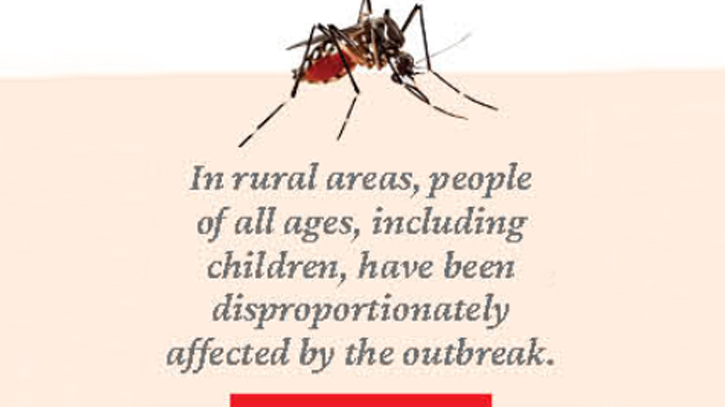
Photo : TDM
The number of dengue fever cases in Narail has been escalating rapidly, with the lack of a dedicated dengue corner in the Sadar Hospital exacerbating the situation. The absence of such a facility has led to dengue patients sharing wards with other patients, posing significant challenges to disease control efforts. Adding to the problem is the alarming mosquito infestation in the vicinity of Narail Sadar Hospital, transforming the area into a potential breeding ground for disease-carrying mosquitoes.
In rural areas like Narail, people of all ages, including children, have been disproportionately affected by the outbreak. Over the past six months, from January to June, 33 dengue cases were reported, but the situation worsened in July, with 52 new cases identified in just 16 days. The crisis reached a peak today (Sunday) when nine new cases were admitted within a single day.
One of the major contributing factors to the epidemic is the unsatisfactory condition of the surroundings near Narail Sadar Hospital. The back drain is prone to waterlogging and overgrown with thick bushes and forests, which provide ideal breeding sites for mosquitoes.
Despite complaints from patients and their families about this dire situation, no action has been taken to address the mosquito proliferation in the hospital vicinity. Both the hospital authorities and local municipal bodies are pointing fingers at each other, blaming the ongoing crisis on their respective lapses.
Hospital authorities have pointed out that the Sadar Hospital is ill-equipped to handle the surge in dengue cases, with only 100 beds available for an overwhelming daily influx of 300 to 350 patients. This pressure has resulted in the unavailability of a separate dengue corner.
Dr. Abdul Gaffar, the Superintendent of Sadar Hospital, highlighted that the hospital's location on low land, coupled with an inadequate drainage system, contributes to water accumulation, facilitating mosquito breeding.
Despite repeated pleas to higher authorities, the hospital is facing a dire manpower crisis, affecting various positions, including doctors and cleaners. Out of the required 39 doctors, the hospital is currently functioning with just 16, and there is not a single government-employed cleaner. As a temporary measure, 28 people are employed through outsourcing, which falls short of meeting the hospital's essential needs.
Addressing the concerns raised by the public, Dr. Sajeda Begum Palin, the Civil Surgeon of Narail, emphasized that the dengue outbreak is predominantly affecting the local population and not due to incoming travelers from other areas. She highlighted the district administration and municipal authorities' collaborative efforts to raise public awareness and ensure cleanliness throughout the region. So far, there have been no reported deaths from dengue in Narail.
TDM/SD








